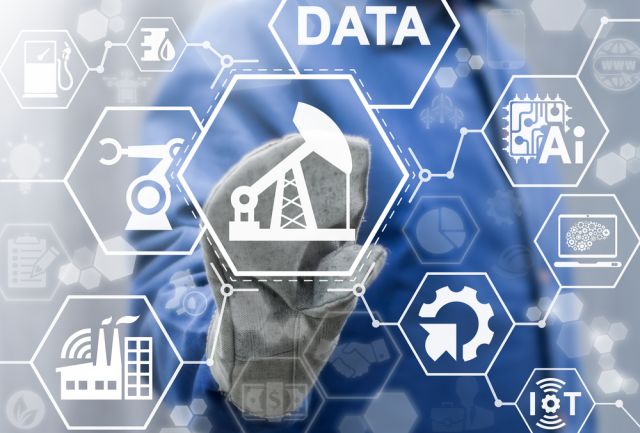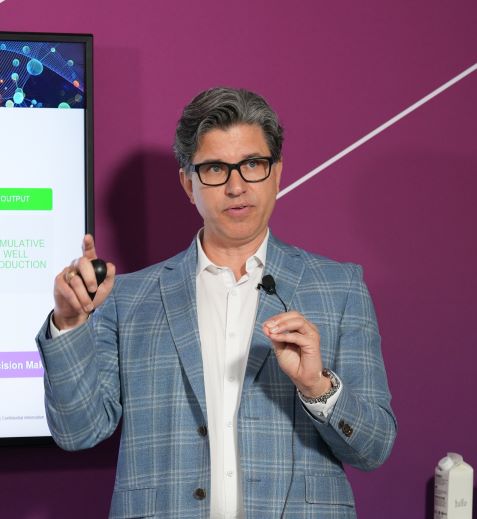
NobleAI provides operators with a software as a service (SaaS) model, custom built for problems ranging from reservoir management to emissions reductions to predictive maintenance. (Source: Shutterstock)
Oil and gas operations aren’t fast. Even a “fast-tracked” development can take months, if not years. NobleAI is looking to use its “science-based AI” to speed up the industry’s operations, the company said at CERAWeek by S&P Global.
“We enable [clients] from a chemicals perspective all the way through materials and into formulation to accelerate their products,” T.C. Zoboroski, NobleAI’s head of energy sales, told the audience at the conference on March 18. “For us, we can take a five-year development cycle down to 90 days.”
NobleAI is a software company that sees itself as a “force-multiplier” to drastically shrink time-to-market, said Zoboroski. To do this, NobleAI provides operators with a software as a service (SaaS) model, custom built for problems ranging from reservoir management to emissions reductions to predictive maintenance.
“We take all the scientific methodologies, all of the different physics and we put that into our product. We take all the statistical, all the empirical data that is being run and we layer our ML [machine learning] AI tools over it,” Zoboroski said.

While there are plenty examples of AI being used in the oil and gas industry, NobleAI positions itself as an improvement of other technologies because of its “science-based AI” approach.
A typical machine learning approach requires enormous amounts of data, but is error prone if data is missing or incomplete, leading to biased outcomes. Large language models are also oftentimes too general for specific tasks, said Zoboroski.
When asked about whether a traditional simulation approach could yield the same results as NobleAI, Zoboroski said that in addition to being costly, simulations are slow and rely on mathematical solvers and humans. This harms the consistency of simulations as “multiple experiments are being run, giving multiple different answers, with multiple people touching it.”
NobleAI’s technology delivers predictions and insights as well as directly generates designs faster than traditional operations. From “molecules to materials to formulations to complete systems,” its platform works for any material, Zoboroski said.
Despite being a smaller company, supermajor Exxon Mobil employed NobleAI’s services for oil production forecasting. NobleAI was able to combine multiple factors and inputs that Exxon provided, build a model and accurately predict which wells would be responsive. Exxon also used NobleAI in a later application to select the optimal proppant for their wells, which led to an increase in production.
“We took all of the inputs from their side—multi-phase flow, well interference, spatial variation of fracture properties—we took inferences that they would only do a handful of over a month, and did millions of inferences,” Zoboroski said. “Suddenly you're accelerating time to production and accelerating time to decision itself.”
Exxon is now using NobleAI to help identify new molecules for surfactants. A new surfactant molecule hasn’t been identified since 1993, Zoboroski said.
As the rest of the world adopts AI, the oil and gas industry can do the same with NobleAI’s technology offering.
Recommended Reading
Permian Surface-owner LandBridge to Raise up to $367MM in IPO
2024-06-17 - Houston-based LandBridge holds some 220,000 surface acres in the Delaware Basin.
TC Energy Shareholders OK Spinning Off Liquid Pipelines Business
2024-06-04 - TC Energy will spin off South Bow Corp., with its primary asset the Keystone oil pipeline, while shifting a hefty amount of TC Energy’s debt to the new company.
Liberty Energy Warns of ‘Softer’ E&P Activity to Finish 2024
2024-07-18 - Service company Liberty Energy Inc. upped its EBITDA 12% quarter over quarter but sees signs of slowing drilling activity and completions in the second half of the year.




